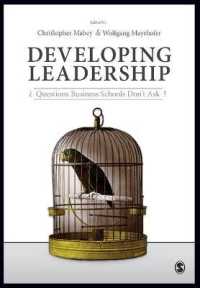- ホーム
- > 洋書
- > 英文書
- > Philosophy
Full Description
At the turn of the twentieth century, no other public intellectual was as celebrated in America as the influential philosopher and psychologist William James. Sought after around the country, James developed his ideas in lecture halls and via essays and books intended for general audiences. Reaching out to and connecting with these audiences was crucial to James—so crucial that in 1903 he identified "popular statement," or speaking and writing in a way that animated the thought of popular audiences, as the "highest form of art." Paul Stob's thought-provoking history traces James's art of popular statement through pivotal lectures, essays, and books, including his 1878 lectures in Baltimore and Boston, "Talks to Teachers on Psychology," "The Varieties of Religious Experience," and "Pragmatism." The book explores James's unique approach to public address, which involved crafting lectures in science, religion, and philosophy around ordinary people and their experiences. With democratic bravado, James confronted those who had accumulated power through various systems of academic and professional authority, and argued that intellectual power should be returned to the people. Stob argues that James gave those he addressed a central role in the pursuit of knowledge and fostered in them a new intellectual curiosity unlike few scholars before or since.
Contents
Contents Acknowledgments Introduction List of Abbreviations Chapter One. Eloquence and Professionalism in the Nineteenth Century Chapter Two. Engaging Science and Society Chapter Three. Talking to Teachers Chapter Four. Speaking Up for Spirits Chapter Five. Religious Experience and the Appealsof Intellectual Populism Chapter Six. Empowering a Pragmatic Public Conclusion Notes Bibliography Index







